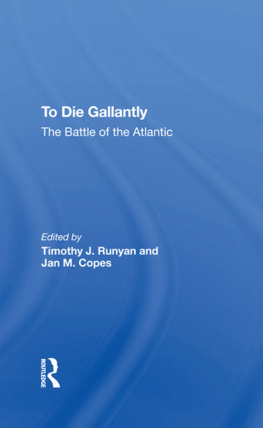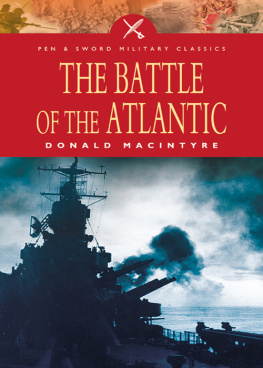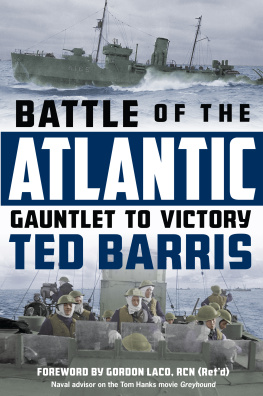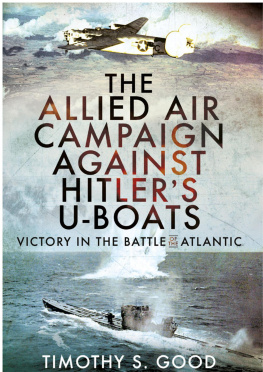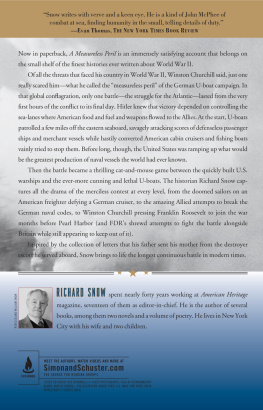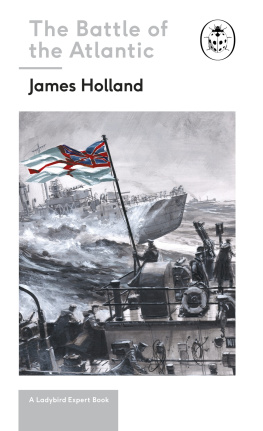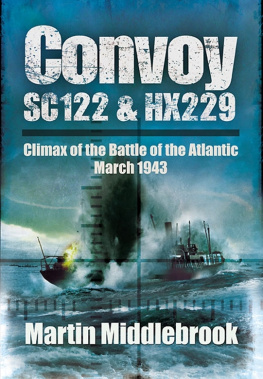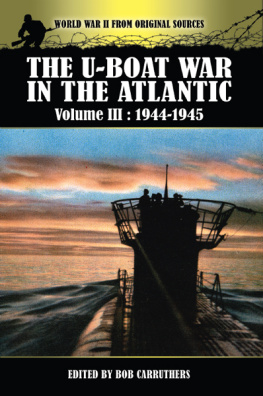To Die Gallantly
HISTORY AND WARFARE
Arther Ferrill, Series Editor
TO DIE GALLANTLY: The Battle of the Atlantic
Timothy J. Runyan and Jan M. Copes, editors
THE HALT IN THE MUD: French Strategic Planning
from Waterloo to Sedan Gary P. Cox
GOOD NIGHT OFFICIALLY: The Pacific War Letters
of a Destroyer Sailor William M. McBride
CRETE: The Battle and the Resistance Antony Beevor
THE HUNDRED YEARS WAR FOR MOROCCO:
Gunpowder and the Military Revolution in the
Early Modern Muslim World Weston F. Cook, Jr.
SUN-TZU: ART OF WAR Ralph D. Sawyer, translator
HIPPEIS: The Cavalry of Ancient Greece
Leslie J. Worley
FEEDING MARS: Logistics in Western Warfare from the
Middle Ages to the Present John Lynn, editor
THE SEVEN MILITARY CLASSICS OF ANCIENT CHINA
Ralph D. Sawyer, translator
FORTHCOMING
THE GENERAL'S GENERAL: The Life and Times of
Arthur MacArthur Kenneth Ray Young
THE ANATOMY OF A LITTLE WAR: A Diplomatic and
Military History of the Gundoval Affair (568-585)
Bernard S. Bachrach
ON WATERLOO
The Campaign of 1815 in France by Carl von Clausewitz
Memorandum of the Battle of Waterloo by the Duke of Wellington
Christopher Bassford, translator
A HISTORY OF WARFARE IN CHINA:
The Period of the Classics Ralph D. Sawyer
ORDERING SOCIETY: A World History of
Military Institutions Barton C. Hacker
WARFARE AND CIVILIZATION IN THE
ISLAMIC MIDDLE EAST, 600-1600 William J. Hamblin
To Die Gallantly
The Battle of the Atlantic
Edited by
Timothy J. Runyan
and Jan M. Copes
First published 1994 by Westview Press, Inc.
Published 2019 by Routledge
52 Vanderbilt Avenue, New York, NY 10017
2 Park Square, Milton Park, Abingdon, Oxon OX14 4RN
Routledge is an imprint of the Taylor & Francis Group, an informa business
Copyright 1994 Taylor & Francis
All rights reserved. No part of this book may be reprinted or reproduced or utilised in any form or by any electronic, mechanical, or other means, now known or hereafter invented, including photocopying and recording, or in any information storage or retrieval system, without permission in writing from the publishers.
Notice:
Product or corporate names may be trademarks or registered trademarks, and are used only for identification and explanation without intent to infringe.
Library of Congress Cataloging-in-Publication Data
To die gallantly : the battle of the Atlantic / edited by Timothy J. Runyan and Jan M. Copes.
p. cm.
Includes bibliographical references (p.) and index.
ISBN 0-8133-8815-5 ISBN 0-8133-2332-0 (pbk.)
1. World War, 19391945CampaignsAtlantic Ocean. 2. World War, 19391945Naval operations. I. Runyan, Timothy J. II. Copes, Jan M.
D770.T6 1994
940.54'5dc20
94-10715
CIP
ISBN 13: 978-0-813-32332-9 (hbk)
Contents
Dean C. Allard
PART ONE
The Early Years
Werner Rahn
Jeffrey G. Barlow
Jrgen Rohwer
Theresa L. Kraus
John F. Bratzel
PART TWO
The "Happy Time"
Donald P. Steury
Robert W. Love, Jr.
Marc Milner
J. David Brown
James T. Cheatham
PART THREE
Turning the Tide
David Syrett
Roger Sarty
Philip K. Lundeberg
R. A. Bowling
Harold D. Huycke
PART FOUR
Looking Back
James E. Valle
Thomas A. King
Joseph F. Meany, Jr.
Robert M. Browning, Jr.
Lawrence Suid
Guide
When Admiral Erich Raeder heard Adolf Hitler's demand in 1939 that the German Navy prepare for war against the Allies, Raeder responded that the Kriegsmarine could do little more than show the world "how to die gallantly." He knew that the German surface navy was not prepared for war, a fact that Hitler refused to recognize. However, the U-boat war in the Atlantic began with disastrous consequences for Allied shipping. This was the "Happy Time" Germany enjoyed before the United States, Britain, Canada, and their allies united to reverse the toll of ships and men while confirming Raeder's prophecy.
Recognizing the pivotal importance of the Atlantic campaign in World War II, the North American Society for Oceanic History (NASOH) devoted its 1992 annual meeting to a commemoration of the fiftieth anniversary of the Battle of the Atlantic. NASOH, which has served as a forum for students of naval and maritime history for over twenty years, was ably assisted in this effort by the Naval Historical Center (NHC) of Washington, D.C.; the Center's facilities at the Washington Navy Yard provided a most appropriate setting for a conference focused on the war at sea. The opportunity brought together scholars from Europe and the Americas to exchange views on various aspects of the conflict, and most of the chapters printed here were first presented as papers at NASOH's Battle of the Atlantic conference. Both NASOH and the NHC are pleased to be able to bring such recent research to a wider audience through the publication of this volume.
The early stages of the war in the Atlantic were a disaster for the Allies, especially for convoys from North America headed to Europe. German U-boats ruled the sea, flaunting American coastal defenses by cruising the waters from the Caribbean to New England. Only the Allies' incredible will to fight and to send newly built ships out into the Atlantic made possible the continuation of war against Germany. The losses were greater than ever experienced by American merchant mariners in any previous conflict. Allied, and especially United States, naval forces were uncertain and ineffective during the early stages of conflict in 1941-1942, unable to respond to the underwater terror that took away the logistical support necessary to supply Britain and Russia in their struggle against the Wehrmacht .
A solution emerged, although painfully slowly, in the form of intelligence technology coupled with the recognition of the benefits of escorted convoys and the work of hunter-killer groups. The secret code of the German high command was broken by the hard work and good fortune of Polish, British, and other counter-intelligence specialists. This most dramatic breakthrough provided an advantage to the Allies that the Germans refused to acknowledge. Furthermore, the development of HF /DF (high frequency I direction finding) technology enabled escorts and hunter-killer groups to seek out the wolfpacks with terrible effect. The employment of long-range air-surveillance planes stationed on aircraft carriers completed the assortment of weapons needed to turn the hunters into the hunted. At the end of the war nearly all German submarines, out of the hundreds sent into combat, had been destroyed.
A study of the Battle of the Atlantic is rightly focused on submarines and intelligence warfare, but there is much more to the conflict, as demonstrated by the essays in this volume. Readers may find it discomforting to learn of conflict between commanders and of arguments among the Allies over issues of control or policy. The Canadians found the Americans short in recognition of their convoy work, and the Americans faulted the British deployment of resources. The U.S. Navy complained that the army failed to provide air support it vitally needed so it decided to create its own air force. Admirals quarreled with politicians, generals, and other admirals. They postured, protested, resigned, or were removed from office. But the war continued, exacting a terrible emotional and physical toll.

